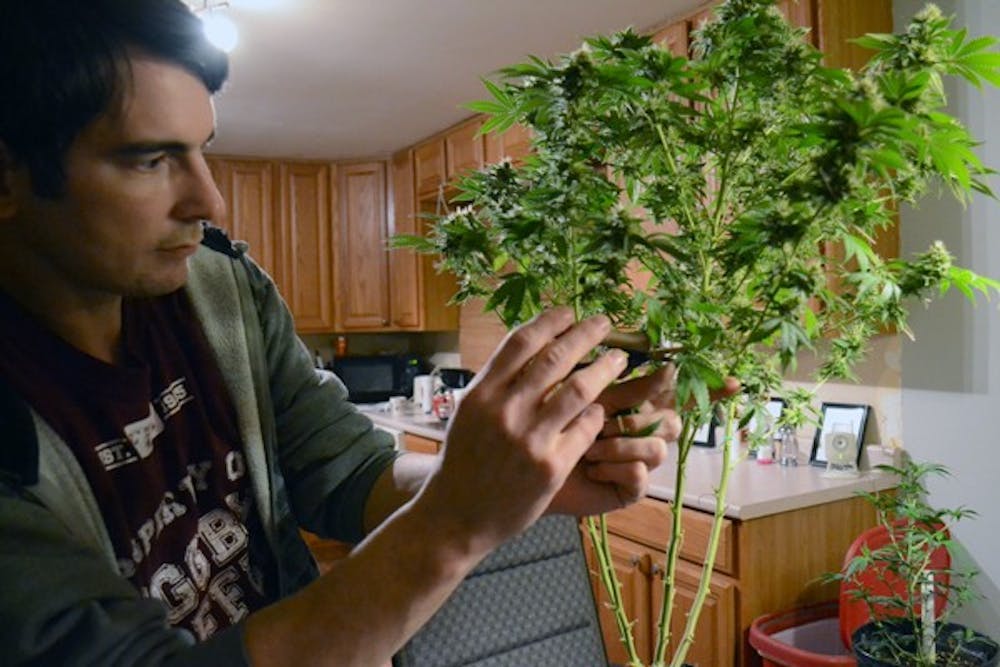Growing Green: New medical marijuana regulations could affect local dispensaries, send production out of Michigan
Matthew Taylor is worried about a new law that could send the growth of medical marijuana to Canada.
Taylor, who is the former owner of Compassionate Apothecary, a marijuana dispensary previously located in Mount Pleasant, said he does not need foreign production to serve his patients with marijuana.
"We don't really need a Canadian company to produce for us," said Taylor, a caregiver since 2008. "That's kind of insulting. We'd do it a lot better if we kept it local instead of (through) a Canadian corporation."
Public Act 268, signed into state law on Dec.30, would allow some Canadian companies to process and provide pharmaceutical-grade marijuana if the federal government decides to regulate the drug for medical use, reclassifying it as a schedule II controlled substance. Weed was previously a schedule I, which means it was in the past seen to have no medical value.
Taylor said he believes there are enough local farmers in Michigan to produce marijuana for the patients in the state who already have cards through the Michigan Department of Licensing and Regulatory Affairs (LARA).
"We know how to do it," Taylor said. "How does this benefit our economy? (Compassionate Apothecary) did it for two years through taxes."
Currently, legislation allows dispensaries to function as long as they are not a public nuisance. It is up to local law enforcement to decide whether the dispensary is a nuisance or not.
Compassionate Apothecary was shut down in 2011 because local authorities believed the business was a nuisance. According to court documents, the dispensary used an illegal locker system for patient-to-patient transfers, illegally profiting from 20 percent of sales.
Taylor and his partner, Brandon McQueen, took the case to the Michigan Court of Appeals in 2011, where they eventually lost the case.
The politics of pot
The newly-signed law would give registered medical marijuana patients the option of getting an enhanced card to let them purchase the controlled substance from pharmacies.
Sen. Roger Kahn, R-Saginaw Township, said the new law would help regulate the potency and quality of medical marijuana, as well as regulate the growing environments for patient safety.
"Facilities that produced medical marijuana would have to comply with requirements and similar to the standards with which current pharmaceutical manufacturers comply," Kahn said in a November press release. "The product would also be tested for potency, which will help doctors with prescribing and dosing, and the product would be distributed through pharmacies only."
Kahn said he believes regulation should be standard practice.
As a constitutional right, Kahn said people should have access to medical-grade marijuana, rather than homegrown. He added that this legislation is meant to protect patient rights more than anything.
"As a physician, it worries me that the constitutional provision contains no patient protection standards," Kahn said, "and in particular, no standards that will protect immune-suppressed patients from molds, pesticides, metals or other contaminates commonly present in marijuana."
House Bill 4271, a bill created to regulate dispensaries across Michigan, was the other half of the medical marijuana legislation being pushed through congress at the end of last year. The bill received bipartisan support in the house in mid-December.
However, it has reached a stalemate in the Senate.
Senate Majority Leader Randy Richardville, R-Monroe, is the chair of the Senate Government Operations committee, where the bill now waits. He was a cosponsor of Senate Bill 660 – a bill Gov. Rick Snyder signed in December. Richardville told the Detroit Free Press he was not a big fan of the legislation that would allow towns to decide if they permit dispensaries in their towns.
“I’m going to sit on them for a while,” Richardville said. “We don’t want this ballot initiative to take over. I believe a vast majority of people who voted for it believed we were talking about (a) prescription type of marijuana.”
Stateside struggles
Taylor said he believes the legislation is an excuse to get rid of American dispensaries and get more money from re-registration through LARA for patients.
"They want to create an enhanced card to let people go to CVS instead of using a LARA card," he said. "Really what they did was do away with dispensaries. It makes it pretty apparent."
House Bill 4271 is intended to refine the law, creating a more consistent interpretation as well as higher standards for those operating the dispensaries within towns.
He is in favor of the new laws because Taylor believes he was in the right from the beginning, bringing what he calls an herbal supplement to those under his care. He said he is more than willing to pay sales tax and licensing fees if it means he can open up his shop again.
"To what degree do we have a duty to start-up and pay sales taxes and show that this can be done and has been done?" Taylor asked. "They can do it in Colorado and Washington. Why not here, too?"
There is still more work ahead for regulation and control of marijuana, Taylor said.
Despite these obstacles, Taylor still believes they are on the right road to bringing medical marijuana patients what they need. He said the next step is making sure the public and others know the rules everyone has to follow to provide care.
"It would help to educate people on this herbal supplement," Taylor said. "We know local control is the rule"




